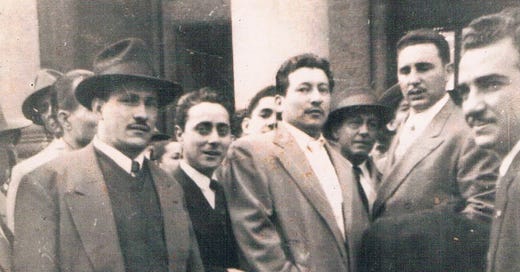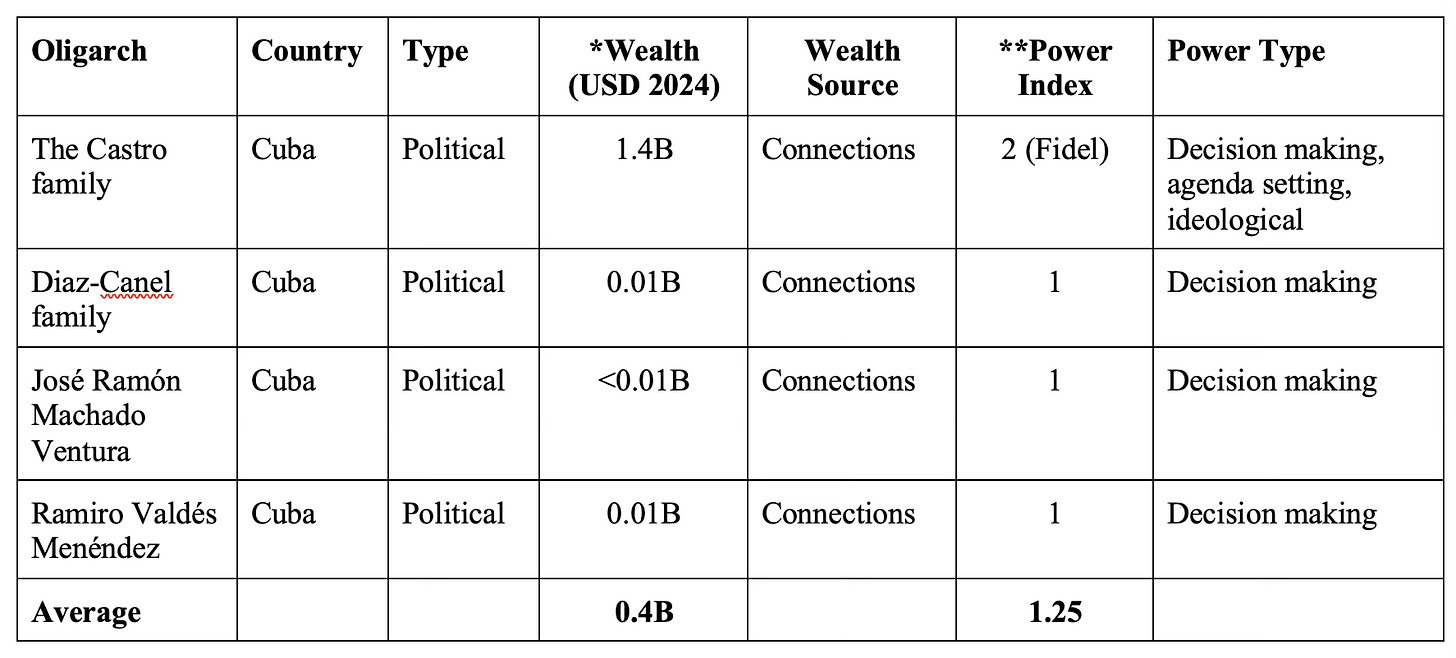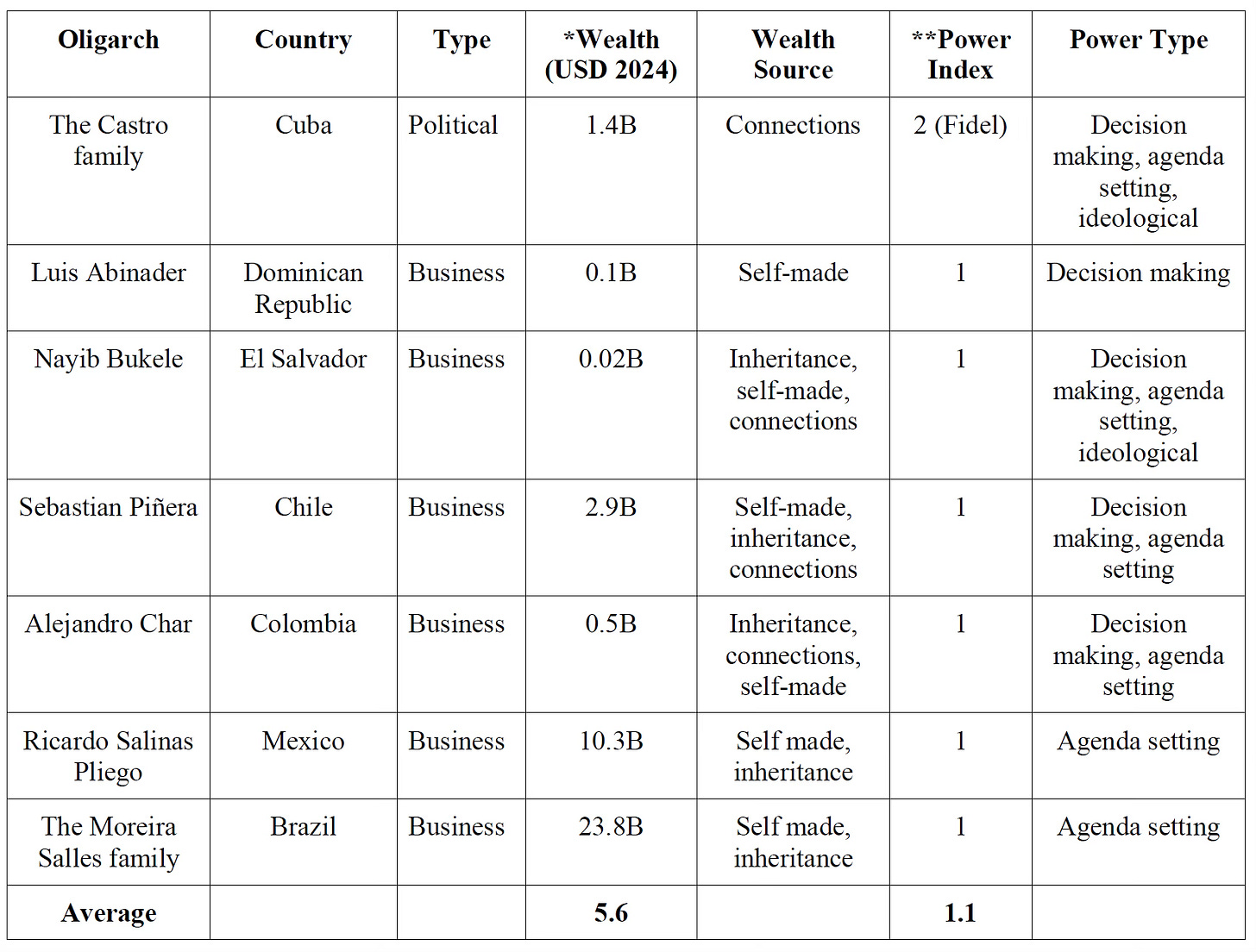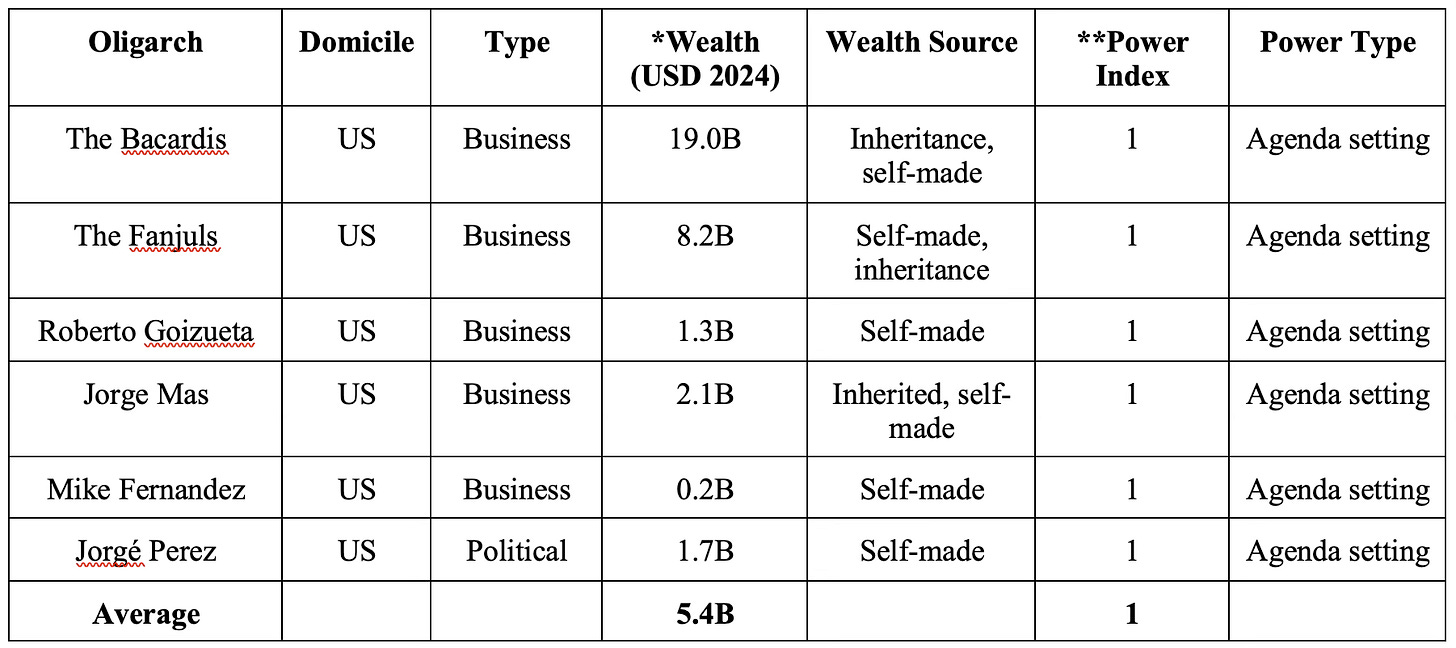Where are the Cuban Oligarchs?
MT799 Authenticated | Independent Contributors Column
Dear Subscribers,
Welcome to MT799 Authenticated, Barbershop Whispers….Russia's (BWR) independent contributors column, which is published on Wednesdays from time to time. The independent contributors are seasoned experts in Russian geopolitics, domestic politics, and business.
The views of MT799 contributors are their views and not necessarily the opinions of BWR or e8Q Technologies LLC.
Publisher’s Note:
In light of President-elect Trump’s nomination of Marco Rubio as the new US Secretary of State, a person with personal ties to Cuba and an interest in Latin America, we invited the two foremost global experts and authors on oligarchs to write about Cuban oligarchs. Where and who are they? Cuba has historically played an essential part in US-Russia relations and plays an outsized role in American domestic politics.
About the Authors:
Valentina Rodríguez Guerra is an author, oligarch researcher, and Ph.D. student at Facultad de Administración, Universidad de los Andes. David Lingelbach is a professor of entrepreneurship at The University of Baltimore. He lived and worked in Russia from 1994 to 1999, where he served as head of Bank of America’s businesses in the former Soviet Union and worked with Vladimir Putin.
Their book, The Oligarchs’ Grip: Fusing Wealth and Power, was published by De Gruyter and shortlisted for a Business Book Award and a Goody Business Book Award. Their soon-to-be-published book, “The Oligarchs of the Americas: From the Conquistadores to Silicon Valley”, will be released in 2026. They established the Center for the Study of Oligarchs to study the important oligarch phenomenon.
Where are the Cuban Oligarchs?
From the conquistadores to today, Cuba’s economy and politics have been dominated by oligarchs. Diego Velásquez de Cuéllar, Julio Lobo y Olavarria, and Raúl Modesto Castro Ruz are all oligarchs, but their wealth and power have been gained in very different ways. Velásquez, Cuba’s conqueror, colonizer, and first governor, died the richest Spaniard in the Caribbean despite losses on expeditions to conquer the Aztecs.
For several years after the 1959 revolution, the brightest and wealthiest in Cuba fled the island and settled in Spain and the United States. In the United States, the Cuban immigrants transformed Miami into an economic and political powerhouse that continues to influence American domestic and international politics. Like the Russian Revolution and subsequent Soviet oppression, Cuba also experienced the exodus of its brightest and wealthiest, which benefited the newly adopted countries.
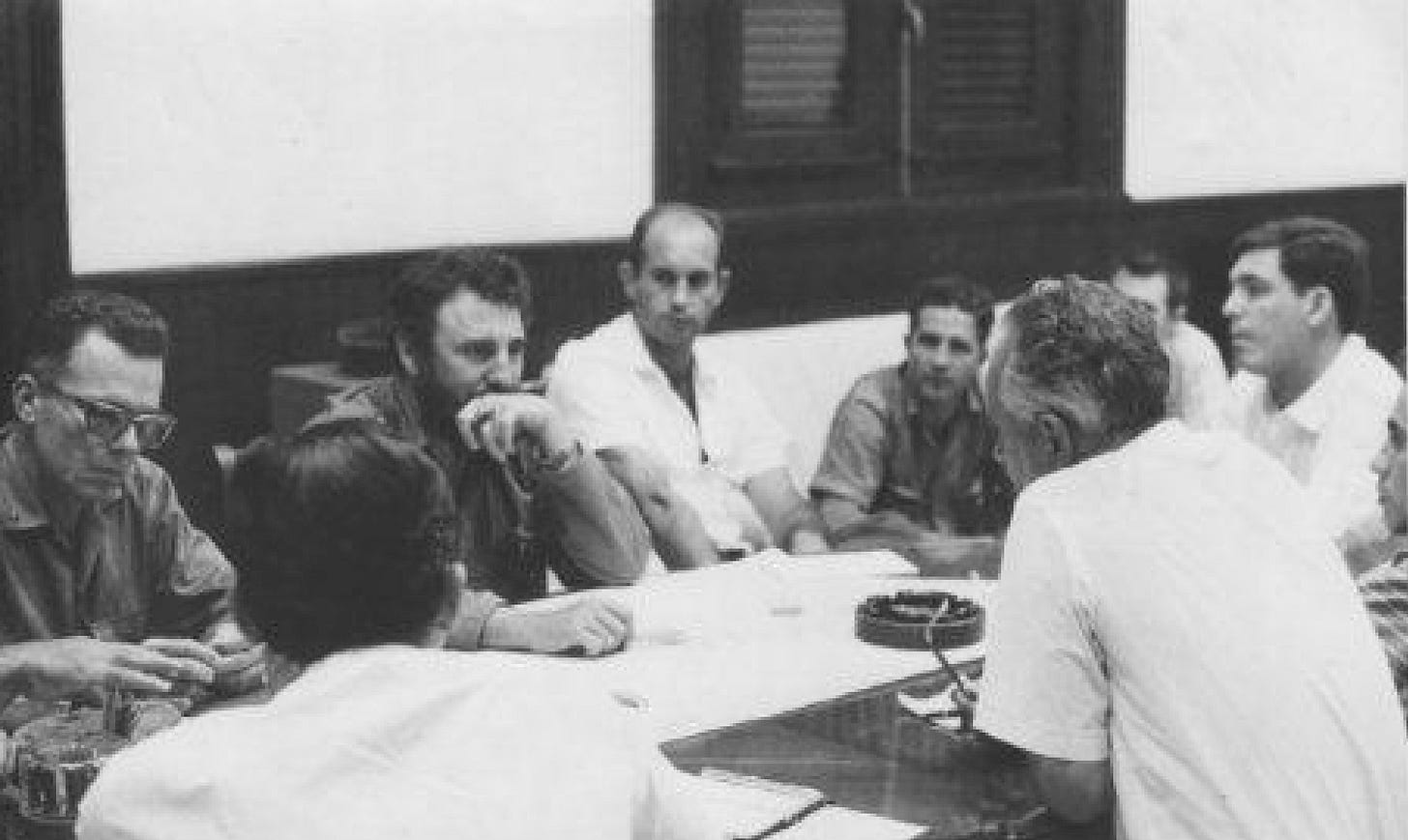
During the 1959 revolution, Julio Lobo was by far Cuba's wealthiest man and an early supporter of Fidel, as were many in the Cuban elite. However, he was powerful enough that Fidel and Che handled him with kid gloves before nationalizing his sugar empire. And Raúl, now a pale shadow, but one of the two most powerful people in Cuba since the revolution along with Fidel, controls the Cuban economy through Grupo de Administración Empresarial S.A (GAESA), the Cuban military’s holding company. It should be noted that GAESA has a substantial presence in the Cuban economy, from tourism to remittances sent to Cuba. For every $1 of remittances sent via Western Union and spent in GAESA retail shops, the military gains $0.74.

Studying Cuba’s oligarchs is incredibly challenging. Other than diaspora members like the Bacardis or the Fanjuls, data on their wealth and political power remains sketchy and not always comparable to the many other oligarchs we’ve studied worldwide.
Still, using the comparative approach (Lingelbach-Rodríguez Oligarch Index1) we’ve employed in our book, The Oligarchs’ Grip, and in recent pieces on Bidzina Ivanishvili (Making Sense of Bidzina Ivanishvili) and Donald Trump (Trump the Oligarch in Context - Eurasian Impact), it is possible to gain a better sense of how these oligarchs compare.
Before the revolution, Cuban oligarchs had relatively modest wealth and power on average:
Since the revolution, Cuban oligarchs have been relatively few. Information about them is scarce and, at best, partially speculative:
Taking the Castros as Cuba’s exemplar oligarchs, how do they compare with other oligarchs in the non-socialist Latin American and Caribbean economies? Answer: they are well below average in their wealth but above average in their power:
Like Lebanon, another oligarch-rich country, Cuba has created an extensive diaspora. Cuban oligarchs who gained wealth and power in Cuba can be distinguished from Cuban diaspora oligarchs and their descendants. The diaspora oligarchs are significantly wealthier than the Castros but less powerful:
The Castros can also be compared with oligarchs in other socialist economies or those transitioning from socialism to a more market-based system. Here again, we see that the Castros, as Cuba’s leading oligarch family group, are less wealthy but more powerful than this cohort’s average:
Prospects
Cuba’s oligarchs today (e.g., the Castros and related individuals) work in an institutional environment that has undergone relatively little change compared to other socialist-origin economies such as Russia and China. Our research demonstrates that institutional change is an engine for creating oligarch-friendly opportunities. When Cuba experiences greater institutional change, we expect it to generate more oligarchs.
In August 2024, the Cuban government authorized political and mass organizations to create private companies. This is not the first time Cuba has experimented with private businesses. In some ways, this move resembles the Soviet Union’s 1988 Law on Cooperatives, which paved the way for the creation of Russian and other post-Soviet oligarchs.
Will Cuba’s transition–when it comes–be similar to Russia’s, in which oligarchs dominate the economy in one form or another? We think the answer to that question is yes, for three reasons. First, oligarchs are rising globally, a point only reinforced by Donald Trump’s election as the 47th US president. Second, oligarchs have a long history in the Americas extending back to the conquistadores (if not earlier).

And third, the prosperity of diaspora oligarchs such as the Bacardis, whose second-generation American children may want to return to their ancestorial home in some form. Cuban oligarchs seem likely to rise from the chaos that will one day replace the current Cuban government.
Additional Reading(s)
US Policy on Remittances to Cuba: What are Some Viable Options? (Center for Strategic & International Studies (CSIS), 15 Sep 2021)
How Canadian Tourism Sustains Cuba's Army and One-Party State (CBC 02 Aug 2021)
The Sugar King of Havana (Americas Quarterly, 27 Apr 2011)
Sugar King of Havana: Cuba’s Last Tycoon (NPR, 1 Aug 2010)
The Cuban Military Owns the Majority of Cuban Hotels (Tourism Analytics 2 May 2022)
Vol 2, No 54 - BWR (MT799) 14.11.2024
Thank you for reading “Barbershop Whispers....Russia” written by Adam A Blanco! “Barbershop Whispers…Russia” is a product of e8Q Technologies, a consultancy with insights on all things Eurasia. Subscribe for free to receive new posts.
*The Weath Index in tables 1 - 5 are average Forbes and Bloomberg estimates when available, or the authors’ estimates. **Power Index Lingelbach-Rodríguez Oligach Index)

